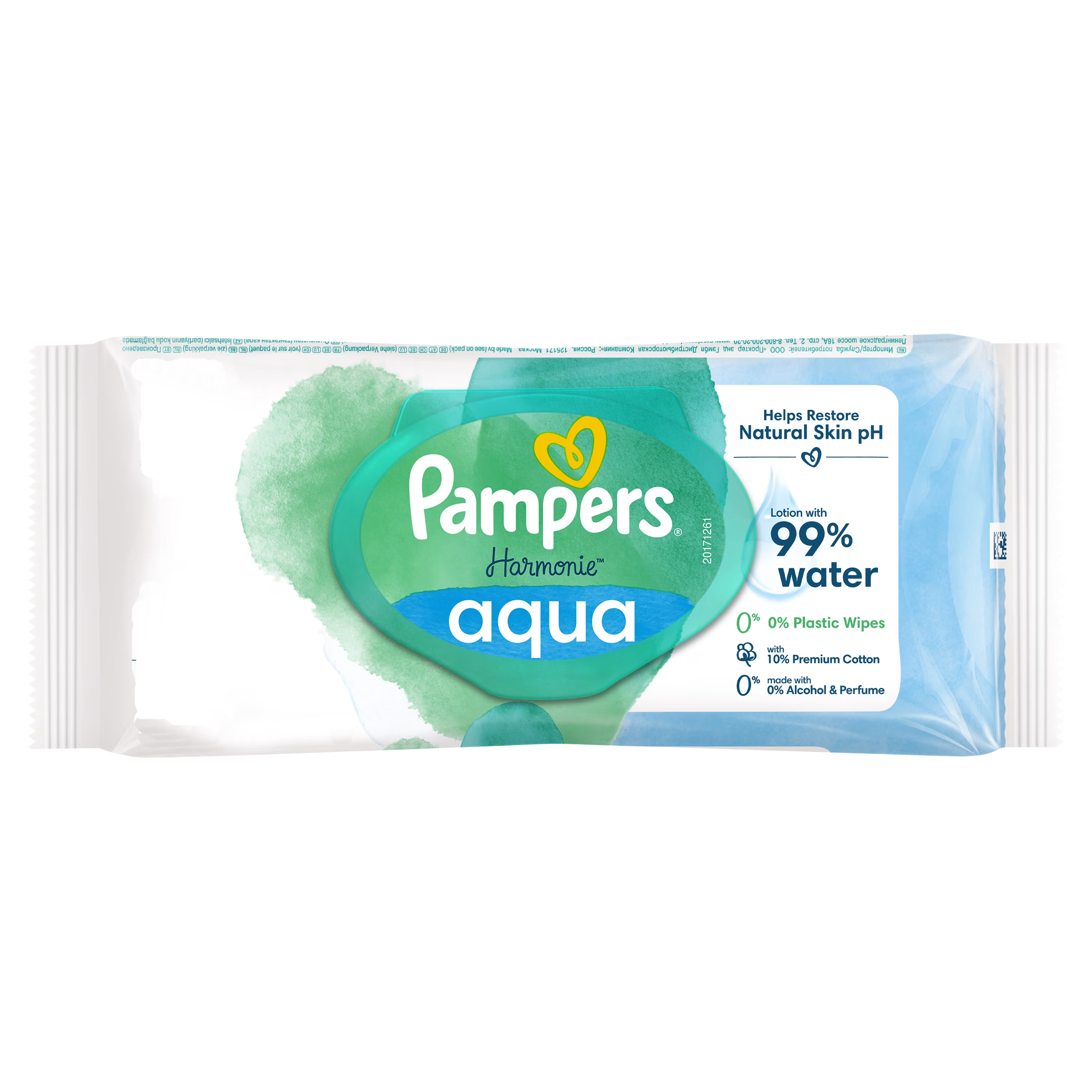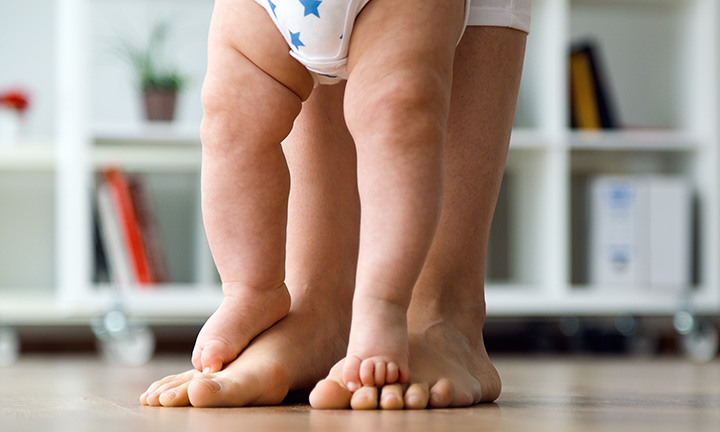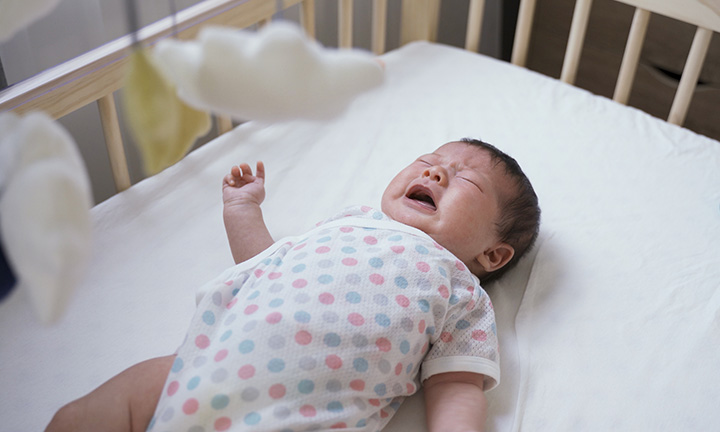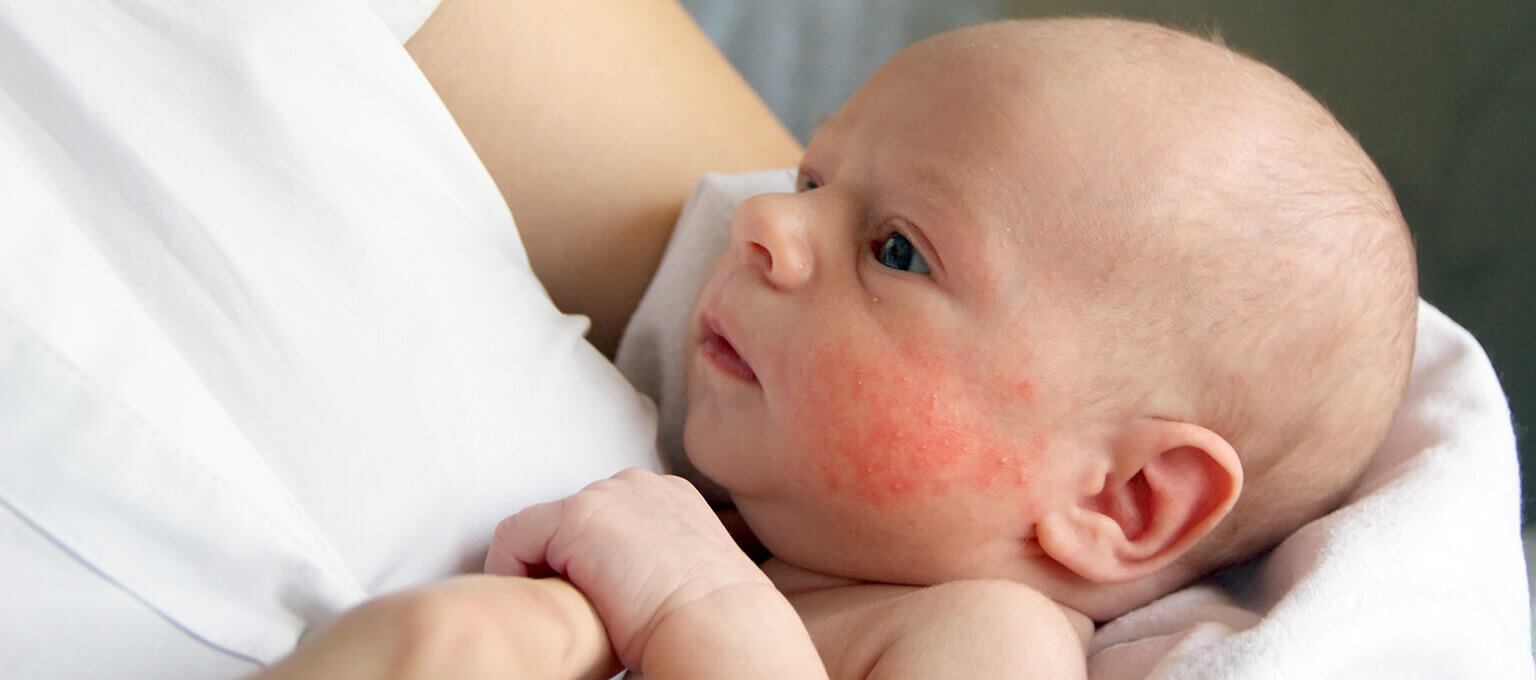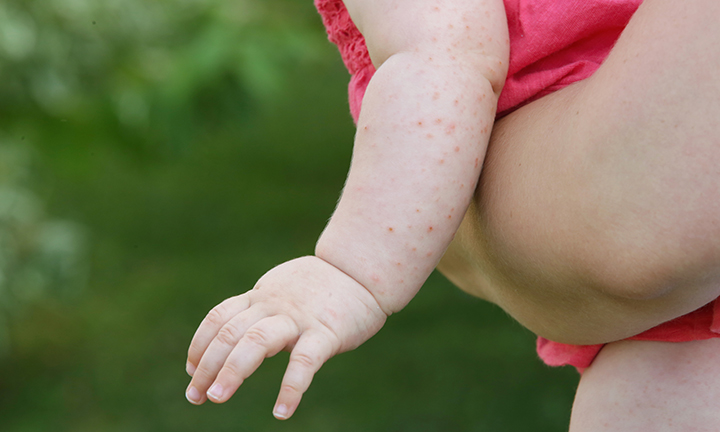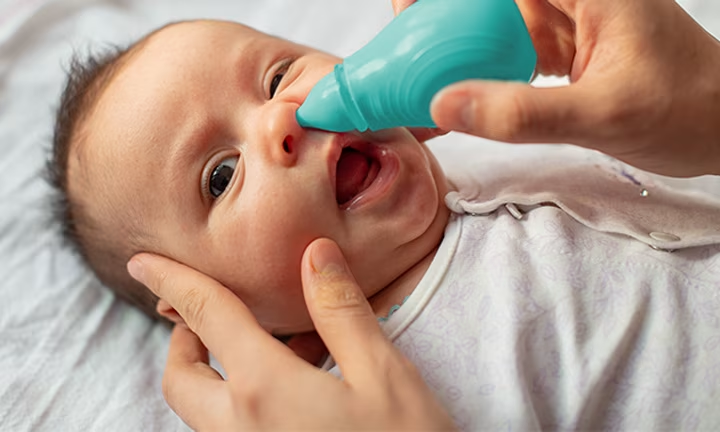
All About Newborn and Baby Congestion
Does your baby have a blocked nose or chest congestion? Newborn and baby congestion is common, as little ones naturally build up mucus but struggle to clear it on their own. Whether due to a cold, allergies or environmental factors, congestion can affect your baby's feeding, sleep and overall comfort.
In this guide, we’ll cover:
Read on to learn how to help your congested baby breathe easier and feel more comfortable.
Why Your Baby’s Nose and Chest Are Congested
Nasal congestion is common in babies under 6 months because they build up mucus without being able to clear it. While colds and infections can worsen congestion, a stuffy nose can occur even when the baby is not ill.
Chest congestion often results from respiratory tract infections (RTIs), like colds. Babies typically experience around eight colds a year as they build immunity, but this usually decreases with age.
Most cases of congestion due to RTIs can be treated at home with simple remedies. While colds usually resolve in five to seven days for older children, it may take newborns up to two weeks to recover.
Common Causes of Nasal Congestion in Babies
A baby’s nasal congestion can occur for several reasons, including:
Causes of Chest Congestion in Babies
Chest congestion in babies is typically due to respiratory infections but can also be influenced by other factors. Common causes include:
By understanding these common causes, you can take steps to help relieve your baby's congestion and monitor for any signs that medical care may be needed.
In Summary
Nasal and/or chest congestion are generally symptoms of a common cold or respiratory infection. Newborns and babies are susceptible to catching colds, especially if they’ve come in contact with an infected person. Although the common cold may often be treated at home, in some cases, the congestion may be caused by an underlying infection requiring a prescription medication to treat. Your child’s GP can make a diagnosis and recommend the appropriate form of treatment.
Baby Development Milestones Taking care of your baby is one of the most important responsibilities as a parent. Track your little one's development with our articles! Learn more
Baby Congestion Symptoms
Your baby can't verbally tell you when they’re congested, but you may notice specific changes in their behaviour and breathing patterns. Whether it’s nasal congestion or chest congestion, the symptoms can impact your baby’s feeding, sleeping and overall comfort. It’s more difficult for babies because they’re unable to clear their airways on their own.
Understanding the signs of both nasal and chest congestion will help you take the necessary steps to ease your baby’s discomfort and know when to seek medical advice.
Signs of Nasal Congestion in Babies
The most common symptoms of baby nasal congestion are:
Your baby may sound congested if they ‘snort’ while breathing. Since children under six months cannot breathe through their mouths, nasal congestion can make feeding more challenging. This may also cause your baby to be more fatigued than usual and disrupt their sleep, especially if they have a blocked nose at night.
If your baby’s blocked nose is caused by a respiratory tract infection, you might observe some of the following additional symptoms:
Signs of Chest Congestion in Babies
Chest congestion in babies can cause discomfort and affect their breathing. Here are common signs to watch for:
If your baby has severe difficulty breathing, a persistent high fever or appears very unwell, seek medical attention immediately.
In Summary
Baby congestion is natural, as your newborn will accumulate mucus in their nose without being able to clear it out. Common baby congestion symptoms include loud breathing, trouble feeding and sleeping more than usual.
If your newborn also has a respiratory tract infection, like a cold, their stuffy nose may be worse and accompany other symptoms, such as sneezing, a wet cough, fever, crying, wheezing or a runny nose.
The Difference Between Dry and Wet Coughs
If your baby’s cough sounds wet (wheezing) or accompanies mucus, it’s most likely due to chest congestion. Coughs tend to last about three or four weeks and typically clear up on their own. Respiratory tract infections are the main causes of chest congestion, as they infect sinuses, throat, airways and/or lungs.
If your baby’s cough doesn’t accompany other symptoms or sounds dry or irritated, they most likely don’t have chest congestion. Dry coughs are often characteristic of conditions like whooping cough, which can produce a ‘whoop’ sound when gasping for breath between coughs, or croup, which can have a barking sound to the cough.
Although coughs can clear up on their own in a matter of weeks, it’s best to contact your doctor or call 111 if your baby is younger than 6 months and has a dry, persistent cough or a wet cough that involves wheezing.
It’s important to note that experts don’t recommend decongestants for children younger than 6 years old or certain over-the-counter cough medicine for children younger than 12 years old, so always check with your doctor before giving your child medication.
In Summary
Your baby may have a congested chest if the cough has a ‘wet’ sound. If your baby seems like they are having difficulty breathing, it’s best to contact their GP, as a cough may indicate a more serious infection. Your baby’s GP is the best person to make a diagnosis and also provide you with treatment advice. Avoid giving your baby over-the-counter cough medicine.
How to Help a Congested Baby
Sometimes, you don’t need to do anything to combat baby congestion. If nasal or chest congestion isn’t interfering with your baby’s feeds or sleeping, you can simply wait for the mucus or infection to clear on its own. However, if your baby seems or feels unwell, can’t sleep or has trouble with feeds, the following remedies might provide some relief.
Quick Solutions for Your Baby’s Blocked Nose
Here are some tips on how to help a newborn or older baby with a blocked nose:
Remedies for Chest Congestion in Babies
If your baby is experiencing chest congestion, several methods may help provide relief. Babies are more susceptible to chest congestion because their airways are smaller, making it harder for them to clear mucus compared to older children or adults.
To help your baby breathe easier and reduce discomfort:
Another important thing to remember is to avoid smoking around your baby. If you smoke around your baby, they have a great risk of developing serious chest illnesses that can cause nasal congestion and coughing, such as bronchiolitis, asthma, croup and pneumonia.
The above remedies can be highly effective for providing relief, but if your baby’s symptoms persist or worsen, always consult their GP to ensure they get the appropriate care.
In Summary
Some easy at-home remedies can help relieve a baby's nasal and chest congestion. You can use saline drops or a cold-steam humidifier to loosen and thin the mucus, making it easier to remove with a bulb syringe and for your baby to breathe. If you’re a smoker, avoid smoking around your baby.
What Does the Colour of Your Baby’s Mucus Mean?
Your baby’s nasal mucus (or ‘snot’) colour can offer clues about their health. While clear mucus is usually normal, variations such as white, yellow or green may indicate different conditions. However, changes in mucus colour should not be taken as definitive indicators of the severity or type of illness. Here’s a general overview of what the colour of your baby’s nasal mucus might mean:
In most cases, mucus changes are normal but contact your baby's GP if you notice dark-coloured mucus or any colour that concerns you, especially if the cold persists for more than a week, your baby has a persistent high temperature (over 38°C), or they have difficulty breathing.
Find out more about when to contact your baby’s GP or seek immediate medical attention in our section below.
When to Contact Your Baby’s GP
You should contact your baby's GP if you notice any of the following symptoms:
If you're concerned about your baby's health and are unable to reach your GP, you can call NHS 111 for advice.
When to Seek Immediate Medical Attention (Call 999 or Visit A&E)
Seek emergency medical attention if your baby exhibits any of the following symptoms:
In these situations, it's essential to act promptly by calling 999 or taking your baby to the nearest A&E department.
It’s natural to worry about your baby when they have congestion or are seeming or feeling poorly. Always trust your instincts as a parent. If you're concerned about your baby's health, seek medical advice promptly.
FAQS AT A GLANCE
There are a few things you can try to help your baby’s congestion:
- Use saline drops and clear out any mucus using a bulb syringe
- Place a cold-steam humidifier in the room where your baby sleeps
- Encourage rest and give your baby extra feeds to stay hydrated
- Don’t smoke around your baby.
The Bottom Line
Congestion is something your baby will experience from time to time, as it’s a common symptom of natural mucus accumulation or a cold. Easy home remedies and treatments, like clearing your little one’s nose with a saline spray and using a cold-steam humidifier in the room where your baby sleeps, can help ease your baby’s congested nose or chest.
You can also talk to your baby’s GP about clearing the nasal passages with saline drops, followed by suctioning out the mucus with a bulb syringe. If the GP gives you the go-ahead, try doing this before feeding and bedtime so it’s easier for your baby to feed and sleep. Before you know it – with your gentle care and lots of cuddles – your little one will be back to their old self again!
Contact your baby’s GP if you have any concerns about their health, including a persistent or worsening cough, a high fever, unexplained weight loss, swollen glands, wheezing or a whooping sound accompanying the cough, feeding less than usual, or they seem more irritable than usual, difficult to console, unusually drowsy or hard to wake up.
- NHS: Allergies
- NHS: Bronchiolitis
- NHS: Chest Infection
- NHS: Childhood Illnesses: When Should I Worry?
- NHS: Colds, Coughs and Ear Infections in Children
- NHS: Cough
- NHS: Cough and Cold
- NHS: Colds and Nasal Congestion
- NHS: Decongestants
- NHS: Is Your Baby or Toddler Seriously Ill?
- NHS: Respiratory Tract Infection
- NHS: Signs and Symptoms of Chest Infections
- NHS: Soothing a Crying Baby
- NHS: Pneumonia
- NHS: Whooping Cough
- NHS: Your Baby’s Health
Read more about Baby
Join Pampers Club and get:


